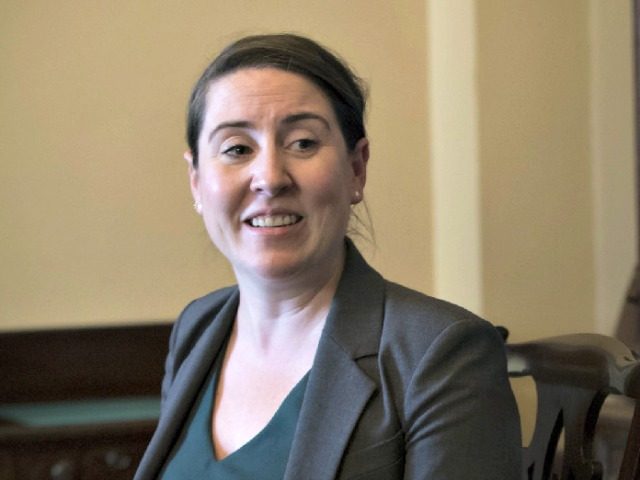President Donald Trump chalked up another win at the Consumer Financial Protection Bureau (CFPB) last week when former deputy director Leandra English announced her resignation and dropped her lawsuit against the White House.
English “plans to resign next week,” the Associated Press reported on Friday.
“English was the chief of staff for Richard Cordray, President Barack Obama’s director of the bureau. She was promoted to deputy director shortly before Cordray resigned in late November. Citing the law that created the bureau, English and Cordray both argued that she was now the acting director of the bureau,” the Associated Press noted in its report, adding:
President Trump, citing longstanding laws over presidential appointees, named his budget director, Mick Mulvaney, as acting director of the bureau. It created a standoff between the White House and the CFPB, and it was unclear for several days who was actually in charge of the bureau.
Congressional Democrats, including Senator Elizabeth Warren, D-Massachusetts, and consumer groups backed English’s legal claim for control of the regulator while banking groups, and Republicans, pushed Mulvaney’s claim.
English quickly sued to block Mulvaney’s appointment, but federal judges repeatedly ruled that President Trump had the power to appoint who he wanted into federal agencies. After Mulvaney was clearly in control of the bureau, English was largely sidelined by the current administration.
“On Friday, she [also] said she would drop her lawsuit . . . now that Mr. Trump has formally nominated Kathy Kraninger to be the agency’s permanent director,” The New York Times reported.
English’s resignation and decision to drop her lawsuit is yet another in a long string of victories for President Trump at the CFPB, the controversial independent agency established under the constitutionally questionable authority of the 2010 Dodd-Frank Act.
Sen. Elizabeth Warren (D-MA) is considered the ideological godmother of the CFPB, and was President Obama’s first choice to run the agency. But when it became clear that Congress would not confirm the far left Warren, then a professor at Harvard Law School, Obama chose Warren protegé Richard Cordray to run the agency. Cordray was confirmed by the Senate in 2013.
Under Cordray’s leadership, the CFPB was widely criticized as being unaccountable and out-of-control.
When President Trump named Mick Mulvaney, director of the Office of Management and Budget, to also serve as acting director of the CFPB, an obscure federal law gave him 210 days to serve in that capacity.
Mulvaney has used his authority at the CFPB to the maximum effect, rolling back many of the most egregious regulations put into effect under the Cordray regime.
In June, just days before Mulvaney’s 210 days were about to expire, President Trump nominated Kathy Kraninger, an aide to Mulvaney in his other job as director of the OMB, to become the new permanent director of the CFPB.
The nomination of Kraninger gives Mulvaney another 210 days to serve as acting director of the CFPB.
As Breitbart News reported last month, Sen. Warren said, “she will put a hold on President Trump’s nomination of Kathy Kraninger to head the Consumer Financial Protection Bureau (CFPB).”
Warren threatens to hold up Kraninger’s nomination until the Office of Management and Budget (OMB) staffer “turns over all documents about her role in” the administration’s enforcement of the border crossing child separation law signed by President George W. Bush more than a decade ago, as detailed in the “zero-tolerance” policy announced by Attorney General Sessions in April.
Other critics of Kraninger’s nomination have cited more substantive reasons to oppose her confirmation, specifically that she has no relevant experience in either banking regulation or consumer finance.

COMMENTS
Please let us know if you're having issues with commenting.